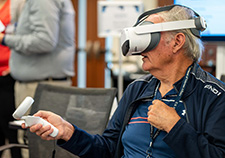Office of Research & Development |
 |


Collaborative mental health care teams in a VA recent study typically included psychiatrists, nurses, psychologists, social workers, and licensed therapists. In some cases, peer support specialists were also involved. (Photo for illustrative purposes only. ©iStock/asiseeit)
March 13, 2019
By Tristan Horrom
VA Research Communications
"Aligning existing mental health treatment resources with evidence-based care models can improve outcomes."
Implementing collaborative chronic care models for mental health reduced hospitalization rates and, for complex patients, improved health status, in a VA Quality Enhancement Research Initiative (QUERI) study. The study also showed that using this type of integrated care system can improve function within the mental health team.
While not all patients in the study had statistically significant mental health improvements, those with multiple mental health conditions did show improvement after the model’s implementation, based on standardized health interviews of Veteran patients.
The results appeared in the March 1, 2019, issue of JAMA Network Open.

VA Researcher Named One of U.S.’ Top Female Scientists

2023 VA Women's Health Research Conference

Self-harm is underrecognized in Gulf War Veterans

Virtual reality technology helps Veterans in pain
Dr. Mark S. Bauer, of the VA Center for Healthcare Organization and Implementation Research (CHOIR) at the VA Boston Healthcare System and first author on the paper, explained the importance of the research: “Mental health conditions affect one in five Americans annually, yet treatment resources are inadequate to meet their needs,” he said. “Aligning existing mental health treatment resources with evidence-based care models can improve outcomes.”
Bauer is also professor emeritus of psychiatry at Harvard Medical School.
Collaborative chronic care models use interdisciplinary teams of health care professionals to coordinate care. In addition to improving teamwork and care processes, collaborative models also aim to help patients take a more active role in their care. Team make-up in the study varied from site to site, usually including psychiatrists, nurses, psychologists, social workers, and licensed therapists. In some cases, peer support specialists were also part of the team.
This type of collaborative model has been proven effective for medical and mental health conditions in numerous randomized controlled research trials, including for treating chronic medical conditions and depression in primary care. However, little is known about how such models perform in general mental health practice. Implementing the model under general clinical practice conditions was the focus of the current study.
For the study, the model was implemented in Behavioral Health Interdisciplinary Program (BHIP) teams in mental health clinics at nine VA facilities. Teams consisted of around six or seven clinicians caring for approximately 1,000 Veterans. Implementation consisted of a remote facilitator working with a mental health team over 12 months. Each facility also had an internal staff member with process-improvement experience to serve as an internal facilitator.
Implementation focused on the model’s six main elements: work role redesign to support anticipatory, continuous care; support for patient self-management; clinical decision support; clinical information systems; linking to community resources; and leadership support. The elements are designed to be flexibly implemented according to each facility’s needs, resources, and priorities.
The researchers studied data on 5,596 Veterans at the VA facilities. About 1,000 of those Veterans and 62 clinicians were interviewed after implementation was complete.
The facilities varied in how effectively they implemented the model, ranging from 44 to 89 percent success. Success was measured based on interviews with staff members using a tool called the Team Development Measure. The greatest improvements were in the team-development measures of role clarity (clarifying each member’s scope of practice, duties, and responsibilities) and team primacy (putting team goals ahead of individual goals).
Patient-level results were mixed. The researchers did not see any improvements in patients’ view of their mental health in the overall study sample, based on a questionnaire called the Veterans RAND 12-item Health Survey. However, the new model did lead to significant improvements on this assessment in patients with three or more mental health diagnoses.
The facilities also saw a lower rate of mental health hospitalizations in the overall population of Veterans treated by the team. While patients not treated by the collaborative teams also had reduced hospitalizations during the study period, the decline was larger for patients treated by the collaborative teams. Over one year of follow-up, the hospital admission for team-treated Veterans was about 14 percent per quarter less than the rate for other Veterans treated in the mental health clinics at the same medical centers.
The results suggest that implementing a collaborative chronic care model in mental health clinics can improve mental health care, say the researchers.
The study was conducted in collaboration with the VA Office of Mental Health and Suicide Prevention.
VA Research Currents archives || Sign up for VA Research updates